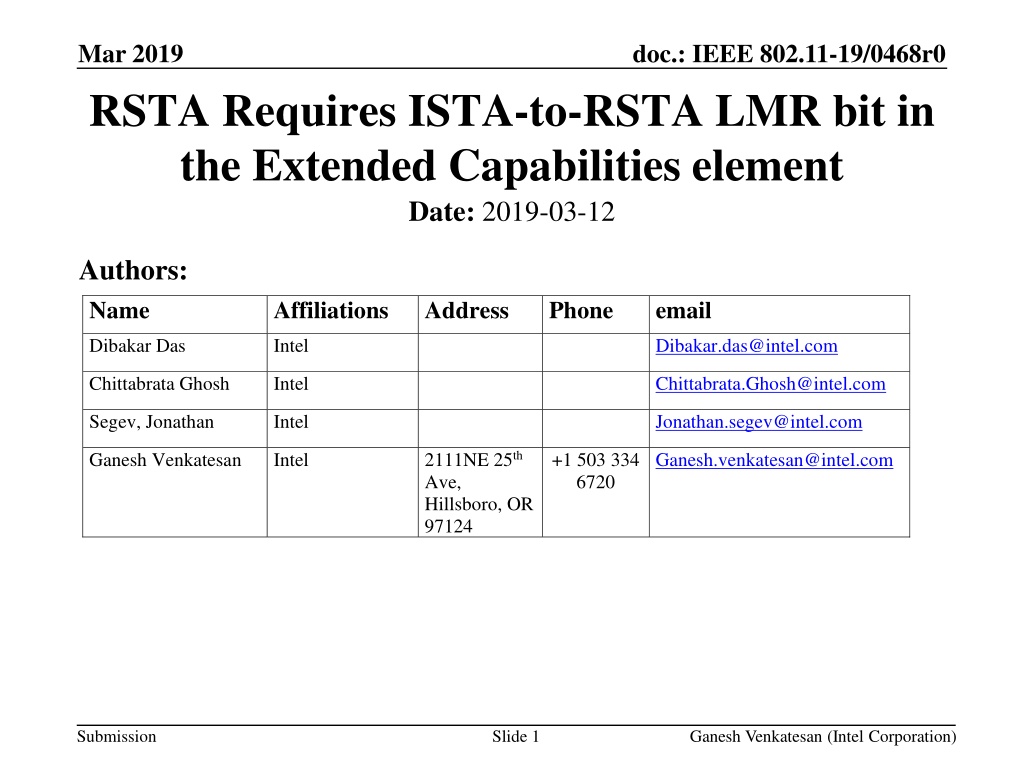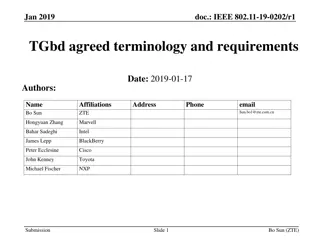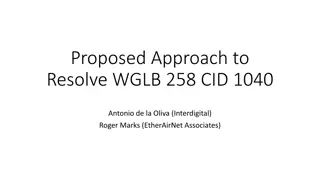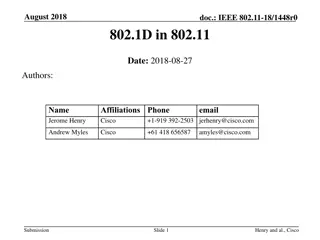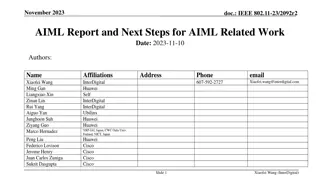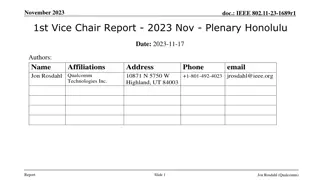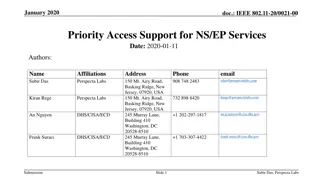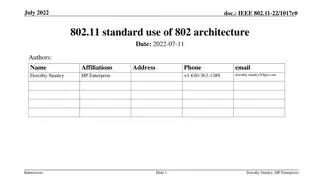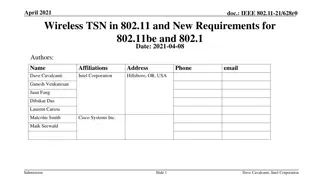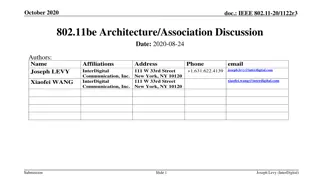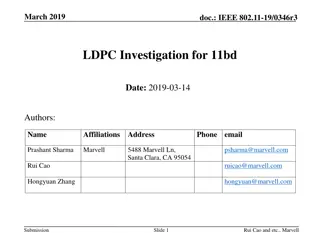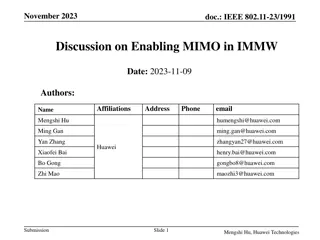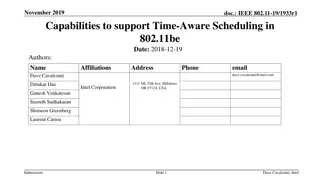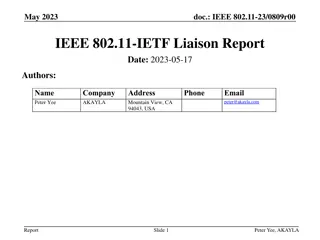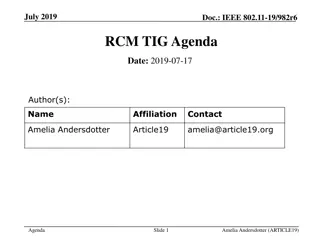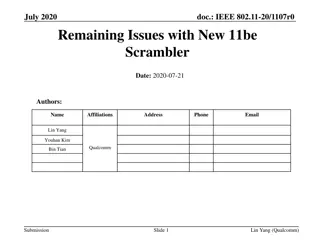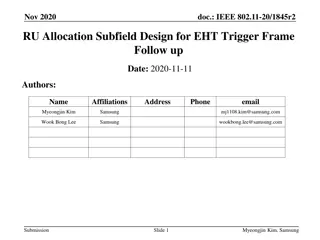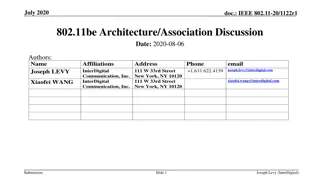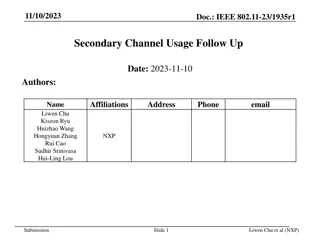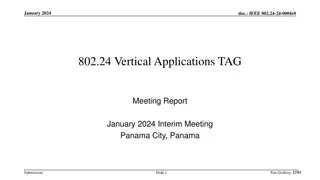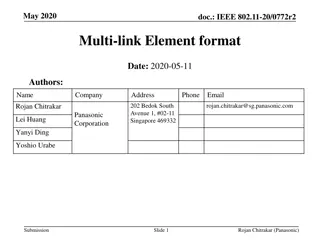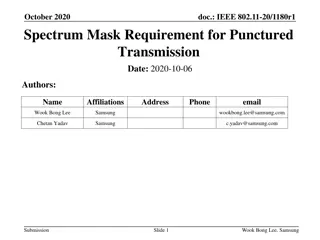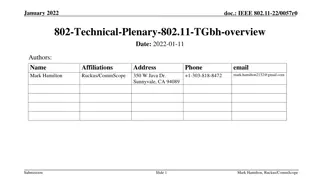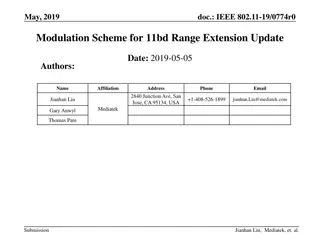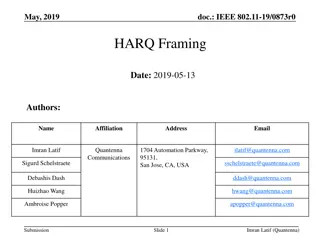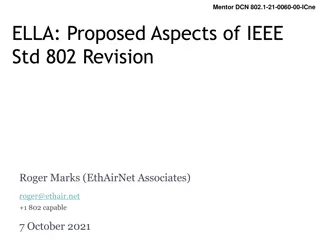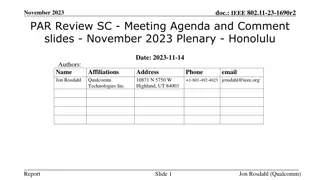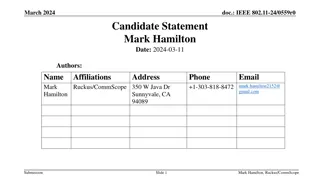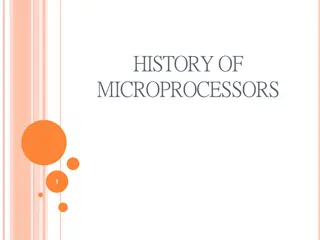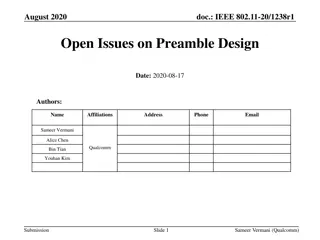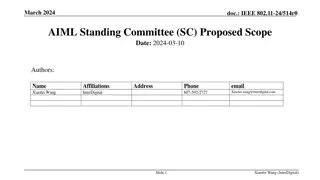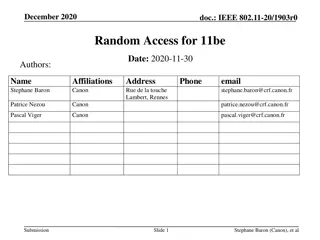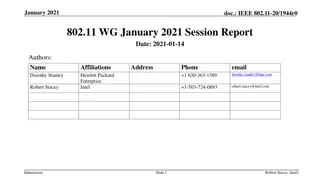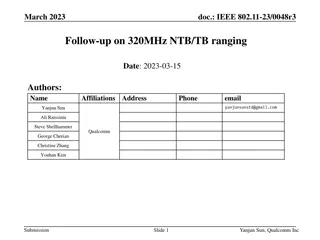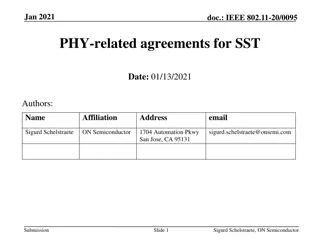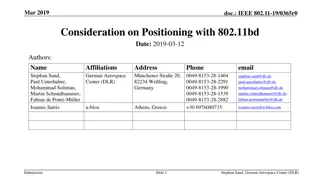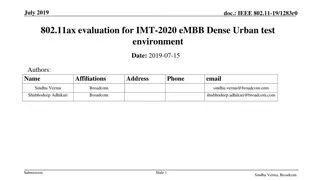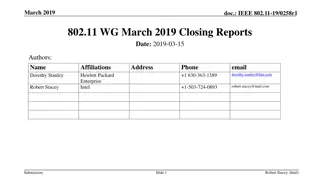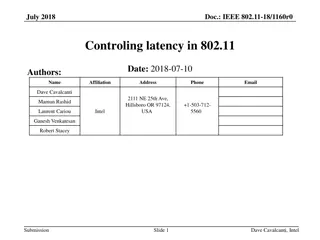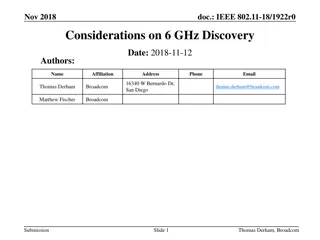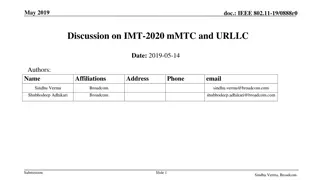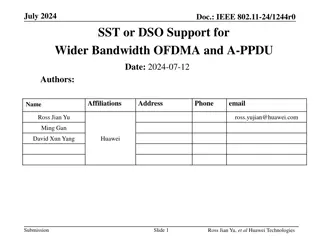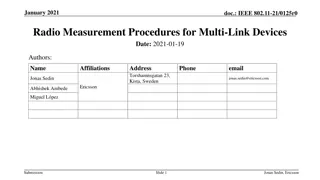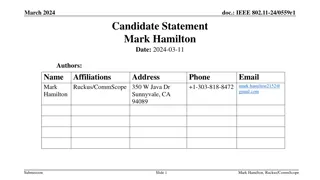IEEE 802.11-19/0468r0 RSTA Requires ISTA-to-RSTA LMR Bit
This document proposes adding a bit in the Extended Capabilities element to indicate if ISTA needs information from RSTA for 11az negotiation initiation. It suggests RSTA advertise its expectation for ISTA to share the Location Measurement Report. By setting the RSTA requires ISTA-to-RSTA LMR bit, RSTA can avoid ISTAs that don't support LMR, thus preventing wasteful transmissions.
Download Presentation

Please find below an Image/Link to download the presentation.
The content on the website is provided AS IS for your information and personal use only. It may not be sold, licensed, or shared on other websites without obtaining consent from the author. Download presentation by click this link. If you encounter any issues during the download, it is possible that the publisher has removed the file from their server.
E N D
Presentation Transcript
Mar 2019 doc.: IEEE 802.11-19/0468r0 RSTA Requires ISTA-to-RSTA LMR bit in the Extended Capabilities element Date: 2019-03-12 Authors: Name Affiliations Address Phone email Dibakar Das Intel Dibakar.das@intel.com Chittabrata Ghosh Intel Chittabrata.Ghosh@intel.com Segev, Jonathan Intel Jonathan.segev@intel.com 2111NE 25th Ave, Hillsboro, OR 97124 Ganesh Venkatesan Intel +1 503 334 6720 Ganesh.venkatesan@intel.com Submission Slide 1 Ganesh Venkatesan (Intel Corporation)
Mar 2019 doc.: IEEE 802.11-19/0468r0 Motivation/Background The criteria for a bit to be added to the Extended Capabilities element is does the ISTA need this information in order to determine if a .11az negotiation should be initiated with the corresponding RSTA? Propose that RSTA advertise its expectation that it expects the ISTA to share the Location Measurement Report with the RSTA by indicating the expectation in the ISTA-to-RSTA LMR, in the Extended Capabilities element Submission Slide 2 Ganesh Venkatesan (Intel Corporation)
Mar 2019 doc.: IEEE 802.11-19/0468r0 Bit(s) in Extended Capabilities element (included in 2.4/5GHz Beacons) RSTA Policy: Bit <ANA>: RSTA requires ISTA to support ISTA-to-RSTA LMR exchange (applies to both TB and nTB) If the ISTA does not set the ISTA-to-RSTA LMR Feedback subfield of the Ranging Parameters field in the Ranging Parameters element included in the initial FTM Request that the ISTA sends to the RSTA to initiate negotiation for a non-Trigger based or a Trigger based FTM session, the RSTA <tbd> reject the negotiation request 1. <tbd> can be may not very useful 2. <tbd> can be shall behavior is clear; if the ISTA does not support (or is no willing to send ISTA-to-RSTA LMR), then the proposed bit helps the ISTA avoid RSTAs that require ISTA-to-RSTA LMR, preventing wasteful transmissions. Submission Slide 3 Ganesh Venkatesan (Intel Corporation)
Mar 2019 doc.: IEEE 802.11-19/0468r0 Opens By setting the RSTA requires ISTA-to-RSTA LMR bit in the Extended Capabilities element to 1, the RSTA implicitly indicates that it is capable of obtaining the ISTA-to-RSTA LMR Is it mandated that the RSTA should retrieve the ISTA-to-RSTA LMR? No The ISTA can discard the ISTA-to-RSTA LMR if the RSTA does not retrieve the LMR before MaxToAAvailableExp Should the ISTA-to-RSTA MaxToAAvailableExp be the same as that of the RSTA-to-ISTA MaxToAAvailableExp? Submission Slide 4 Ganesh Venkatesan (Intel Corporation)
Mar 2019 doc.: IEEE 802.11-19/0468r0 Changes to the specification Add the RSTA requires ISTA-to-RSTA LMR bit to the Extended Capabilities element Add a MIB entry corresponding to this policy in Annex-C In Clause 11.22.6.3.3 (Trigger-based and non-Trigger-based Ranging Measurement Negotiation) add a condition similar to the following: An RSTA shall reject a request if it has set the RSTA requires ISTA-to- RSTA LMR field in the Extended Capabilities element to 1, and the ISTA has sent an initial FTM request with a Ranging Parameters element in which the ISTA-to-RSTA LMR feedback subfield in the Ranging Parameters field is set to 0. Other changes resulting from how the issues listed in the previous slide are resolved. Submission Slide 5 Ganesh Venkatesan (Intel Corporation)
Mar 2019 doc.: IEEE 802.11-19/0468r0 Straw Poll We support incorporating a RSTA requires ISTA-to- RSTA LMR bit in the Extended Capabilities element. The semantics of this bit is for the RSTA to reject a request for a Fine Timing Measurement session that does not indicate support for ISTA-to-RSTA LMR. Y: N: Abstain: Submission Slide 6 Ganesh Venkatesan (Intel Corporation)
Mar 2019 doc.: IEEE 802.11-19/0468r0 Backup Submission Slide 7 Ganesh Venkatesan (Intel Corporation)
Mar 2019 doc.: IEEE 802.11-19/0468r0 EULA is between an App and a Cloud Service When user consents to a prompt from an App, the EULA is executed with a peer Cloud Service ISTA and RSTA are out-of-the-loop However, ISTA may or may not execute a IFTMR/IFTM exchange with the RSTA based on what the RSTA requires (as advertised in the beacon based on what the cloud service requires) and what the User of the App has consented to How can an AP that services multiple Cloud Service and an ISTA that serves multiple Apps harmonize the Cloud Service/ISTA App requirements into a bit in the RSTA beacon/ISTA capability? Implementation dependent A potential policy: Enforce the most-constraining-requirement Submission Slide 8 Ganesh Venkatesan (Intel Corporation)
Mar 2019 doc.: IEEE 802.11-19/0468r0 Potential Modifications -- Discussion The RSTA require ISTA-to-RSTA LMR bit (enabled) is conditional on the RSTA requires PMF bit (enabled) Guarantees all management frames (IFTMR/IFTM/LMR) are protected Minimizes ISTA s concern in sharing its location with the RSTA The ISTA can constrain how the RSTA gets to use the ISTA-to-RSTA LMR Examples use it within the AP but not transmit it outside the AP Discard the ISTA-to-RSTA LMR after <seconds> Anonymize the ISTA-to-RSTA LMR before use others Submission Slide 9 Ganesh Venkatesan (Intel Corporation)
Mar 2019 doc.: IEEE 802.11-19/0468r0 ISTA-to-RSTA LMR a benefit Can be used for the RSTA to provide feedback on the accuracy of the estimate RSTA can estimate relative position of the ISTA Validate the RSTA s estimate of the ISTA s relative position against what the ISTA-to-RSTA LMR estimate is; and provide feedback on how good it is Submission Slide 10 Ganesh Venkatesan (Intel Corporation)
Mar 2019 doc.: IEEE 802.11-19/0468r0 Other Comments Can the RSTA decide to abort/end the session if the session was established with the ISTA indicating support for ISTA- to-RSTA LMR but not reporting ISTA-to-RSTA LMR when requested by the RSTA? This behavior is already part of the current specification The RSTA can end/abort the session at any time (even without a reason) Can the RSTA advertise the RSTA requires ISTA-to-RSTA LMR but not reject a request that does not indicate support for ISTA-to-RSTA LMR? This is possible but beats the purpose of the advertisement. Can the RSTA not request ISTA-to-RSTA LMR? Yes. The ISTA discards measurements after the expiry of MaxToAAvailableExp Slide 11 Submission Ganesh Venkatesan (Intel Corporation)
